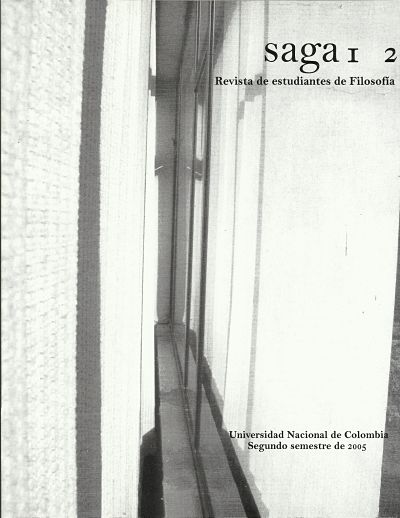Metodología 'científica' en la explicación de la fuerza gravitacional: anotaciones sobre la causalidad ontológica de la fuerza en Isaac Newton
‘Scientific’ Methodology in the Explanation of Gravitational Force: Annotations on the Ontological Causation of Force in Isaac Newton
Palabras clave:
Alquimia, filosofía de la ciencia, filosofía moderna, gravitación universal, historia de la ciencia, Isaac Newton, mecánica racional, metafísica, teología. (es)Alchemy, philosophy of sciencie, modern philosophy, universal gravitation, history of science, Isaac Newton, rational mechanics, metaphysics, theology. (en)
Descargas
The experimental and mathematical conceptualization of the force of universal gravitation, such as it has been set forth by Isaac Newton in his Principia —contrary to the interpretation centered on his scientific work— is not a finished realization. What has been called the ontological causation of force, that is, the question about the nature of the agent responsible for the action of gravitational force, is not excluded from scientific inquiry and relegated to metaphysical and theological domains, as Cohen expects. The paper shows how a correct interpretation of the problem of the ontological causation of force arises from a correct interpretation of Newton’s scientific methodology, that is, from a clarification of its scopes and limits.
Referencias
BECK, L. W.
(1952) The Method of Descartes. A study of the Regulæ. Oxford: Clarendon Press.
BOAS (Hall), Marie.
(1952) «The Establishment of the Mechanical Philosophy», En: Osiris 10, 412–541. [revisión de la tesis doctoral titulada Robert Boyle and the Corpuscular Philosophy: A study of Theories of Matter in the Seventeenth Century (Cornell 1949)].
BERTOLONI MELI, Domenico.
(1993) Equivalence and Priority: Newton versus Leibniz. Oxford: Clarendon.
CASTILLEJO, David.
(1981) The Expanding Force in Newton’s Cosmos. Madrid: Ediciones Arte y Bibliofilia.
COHEN, I. Bernard.
(1980 [1983]) La Revolución Newtoniana y la Transformación de las Ideas Científicas (trad. C. Solís Santos). Madrid: Alianza.
COHEN, I. Bernard & SMITH, George. (eds.)
(2002) Cambridge Companion to Newton. Cambridge: Cambridge University Press.
COLLINS, John.
(1712 [1856]) Commercium Epistolicum J. Collins et Aliorum de Analysi Promota. Paris: Mallet Bachelier.
DEBUS, Allen.
(2002) The Chemical Philosophy. Paracelsian Science and Medicine in the Sixteenth and Seventeenth Centuries. New York: Dover.
DESCARTES, René.
[AT] (1973–1978) Œuvres de Descartes. (ed. C. Adam & P. Tannery). 12 vols. Paris: Libraire Philosophique J. Vrin & Centre National de la Recherche Scientifique.
DOBBS, Betty Jo Teeter.
(1975) The Foundations of Newton’s Alchemy or ‘The Hunting of the Green Lyon’. Cambridge: Cambridge University Press.
(1991) The Janus Faces of Genius, The Role Alchemy in Newton’s Thought. Cambridge: Cambridge University Press.
FEYERABEND, Paul
(2001) La conquista de la Abundancia. La abstracción frente a la riqueza del ser. (ed. Bert Terpstra). Barcelona: Paidós.
GABBEY, Alan.
(2002) «Newton, active powers, and the mechanical philosophy». En: Cohen & Smith 2002, 329–357.
GUICCIARDINI, Niccolò.
(1998) «Il dibattito sui metodi matematici per la filosofia naturale di Isaac Newton dal 1687 al 1736». En: Atti del XVIII Congresso di storia della fisica e dell’astronomia. Bolonia: BT, 1–8.
HARPER, William.
(2002) «Newton’s argument for universal gravitation». En: Cohen & Smith 2002, 174–201.
HERIVEL, John.
(1965) The Background to Newton’s ‘Principia’. A study of Newton’s dynamical researches in the years 1664–1684. Oxford: Clarendon Press.
HENRY, John.
(1998) «Nature, the Church and the State (National Styles in Science: Experimental Philosophy in Seventeenth-Century France and England)». En: Les Cahiers de Science et Vie 45, 80–86.
HUYGENS, Christiaan.
(1888–1950) Œuvres Complètes. 22 vols. La Haye: Martinus Nijhoff & Société Hollandaise des Sciences.
KOYRÉ, Alexandre.
(1968) «Les Regulæ Philosophandi». En: Études newtoniennes. Paris: Gallimard, 317–329.
KUBRIN, David.
(1967) «Newton and the Cyclical Cosmos: Providence and the Mechanical Philosophy». En: Journal of the History of Ideas 28 (3), 325–346.
MAMIANI, Maurizio.
(2002) «Newton on prophecy and the Apocalypse». En: Cohen & Smith 2002, MCGUIRE, James E.
(1970) «Newton’s ‘Principles of Philosophy’: an intended Preface for the 1704 Opticks and a related draft fragment». En: The British Journal for the History of Science 5 (18), 178–186.
(1995) Tradition and Innovation. Newton’s Metaphysics of Nature. Dordrecht: Kluwer.
MCMULLIN, Ernan.
(1978) Newton on Matter and Activity. Notre Dame (Indiana): University of Notre Dame Press.
NEWTON, Isaac.
(1706) Optice: sive de reflexionibus, refractionibus, inflexionibus et coloribus Lucis. Londini: Impensis Sam. Smith & Benj. Walford, Regiae Societatis Typograph. Ad Insignia Principis in Coemetrio D. Pauli.
(1714/5) «An Account of the Book Entituled Commercium epistolicum Collinii & aliorum, de analysi promota; Published by order of the Royal Society, in Relation to the Dispute between Mr. Leibnitz and Dr. Keill, about the Right of Invention of the Method of Fluxions, by Some Call’d the Differential Method». En: Philosophical Transactions of the Royal Society of London 29, 173–224.
(1717) Opticks: or a Treatise of reflexions, refractions, inflexions and colours of Light. The second edition with additions. London: Printed by W. Bowyer for W. Innys at the Prince’s Arms in St. Paul’s Church–Yard.
(1962) Unpublished Scientific Papers of Isaac Newton. A Selection from the Portsmouth Collection in the University Library Cambridge (ed. A. Rupert Hall & M. Boas Hall). Cambridge: Cambridge University Press
NEWTON, Isaac.
(1972) Philosophiæ Naturalis Principia Mathematica. The third edition (1726) with variant readings. 2 Vols. (ed. A. Koyré & I. B. Cohen & A. Whitman). Cambridge, Mass.: Harvard University Press.
(1978) Isaac Newton’s Papers & Letters on Natural Philosophy and related documents (ed. I. Bernard Cohen & Robert E. Schofield). Cambridge, Mass.: Harvard University Press.
(1985) Certain Philosophical Questions: Newton’s Trinity Notebook (ed. J. E. McGuire & M. Tamny). Cambridge: Cambridge University Press.
OROZCO E., Sergio H.
(2004) «Algunos pasajes de las Quæstiones quædam philosophicæ de Isaac Newton». En: Versiones 3, 65–83.
SHAPIRO, Alan.
(2002) «Newton’s ‘Experimental Philosophy’». Disponible en la World Wide Web: http://philsci-archive.pitt.edu/archive/00000534/00/Experimental_Philosophy.pdf [Conferencia pronunciada en la Universidad de Pittsburgh el 19 de enero de 2002 en el ciclo «History Unveiled Science Unfettered».]
SMITH, George E.
(2002) «The Methodology of the Principia». En: Cohen & Smith 2002, 138–173.
TUCHANSKA, Barbara.
(2004) «Clío se encuentra con Minerva: las interrelaciones entre historia y filosofía de la ciencia» (trad. S. H. Orozco). En: Versiones 2, 65–79.
WESTFALL, Richard S.
(1962) «The Foundations of Newton’s Philosophy of Nature». En: The Brisith Journal for the History of Science 1 (2), 171–182.
(1980) Never at Rest. A Biography of Isaac Newton. Cambridge: Cambridge University Press.
(1996) Isaac Newton: una vida. Cambridge: Cambridge University Press.
WHITESIDE, Derek T.
(1991) «The Prehistory of the Principia from 1664–1686»En: Notes and Records of the Royal Society of London 45, 11–61.
Cómo citar
APA
ACM
ACS
ABNT
Chicago
Harvard
IEEE
MLA
Turabian
Vancouver
Descargar cita
Visitas a la página del resumen del artículo
Descargas
Licencia
Todos los documentos alojados en esta web están protegidos por la licencia CC attribution non commercial no derivatives 4.0 intenational

















